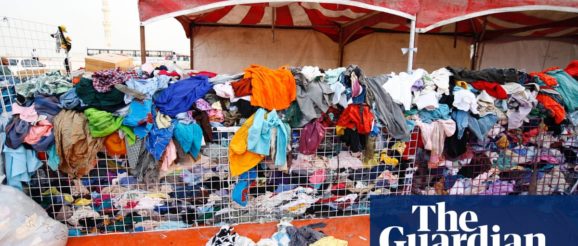There is more to closed-loop textile recycling than technological innovation | Guardian Sustainable Business | The Guardian

Imagine a world in which all new clothes were made from existing clothing and textiles. Garments unsuitable for reuse would get broken down through an environmentally friendly process. Resources including polyester and cotton would be recaptured and turned back into yarn, fabric and then garments with no loss of quality. What this would mean, in the case of polyester, is that one day we will no longer need oil to produce it.
Technology to make this happen exists: Swedish companies recently presented the world’s first garment made entirely from recycled cotton and should be coming to market in the coming years. These technologies represent the next generation of recycling: “closed loop” or “circular textiles” where current mechanical hurdles are overcome, including the inability to separate blended fibre garments, dyes and other contaminants. With this, the ability to produce a fibre comparable in quality and price to that produced from virgin-derived resources will become normal.
With these innovations on the horizon, it is important to note that technology alone will not bring about a circular flow of resources in textiles. The biggest challenge will be engaging the public and putting collection systems in place. With re-use and recycling rates for clothing and household textiles in the UK at around 40% (pdf) there is still a long way to go. In regions such as eastern Europe and sub-Saharan Africa, where garments most often get sent for reuse, there is little in the way of recycling at all.
Some forward-thinking high street retailers and brands, including H&M, M&S, Puma, and Patagonia are paving the way to a circular resource model with in-store collection programmes. Customers get a discount on future purchases for returning their worn garments, helping to change behaviour while increasing sales (though this approach has been criticised for encouraging further consumption).
High street brands are getting in on the act. McDonald’s UK has committed to a closed loop system for its staff uniforms. Worn Again worked with McDonald’s before the 2012 Olympics to set up a collection system for their old uniforms in preparation, making the pledge to close the loop on its staff uniforms as well as running its UK fleet on bio-diesel made from recycled cooking oil from restaurants, among other initiatives.
Reuse will still be the most environmentally and economically beneficial option in future. Textiles that are only suitable for down-cycling into lower value products like industrial wipers and furniture stuffing (which eventually end up in landfill despite a second use) may increase in value in closed-loop recycling systems. This, in turn, will present economic opportunities for textile recyclers, charities associated with textile recycling, textile manufacturers and retailers.
Besides learning to return what we buy, very little else may need to change for consumers. The idea of loyalty cards based around “polymers in your closet” or “cotton credits” could be quite interesting however. Rather than leasing garments in the future, perhaps we will lease the resources they are made from through a credit and debit system that rewards consumers based on what they return to the system?
While there is hunger for a solution to textile waste, designing it out of the system will not happen without consumer involvement and incentives. One will be around the perceived value of clothing – not necessarily of the garments themselves, but of the resources they represent. This will be the incentive for retailers, because for how long is a business model based on depleting virgin resources really sustainable?
Cyndi Rhoades is founder of Worn Again and tweets @cyndirhoades
The circular economy hub is funded by Philips. All content is editorially independent except for pieces labelled advertisement feature. Find out more here.
Join the community of sustainability professionals and experts. Become a GSB member to get more stories like this direct to your inbox
